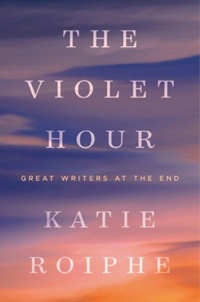 In a New York Times article to promote her new book The Violent Hour: Great Writers at the End, Katie Roiphe talks about the false notion that “when someone is dying, a new, honest, generous space opens up; that in the harrowing awfulness of dying there is a directness, an expansiveness, a loosening of inhibitions, the potential for things to be said that could not be said before. But if one does actually manage to pull off a last conversation, what can it be but a few words in a lifetime of talk?”
In a New York Times article to promote her new book The Violent Hour: Great Writers at the End, Katie Roiphe talks about the false notion that “when someone is dying, a new, honest, generous space opens up; that in the harrowing awfulness of dying there is a directness, an expansiveness, a loosening of inhibitions, the potential for things to be said that could not be said before. But if one does actually manage to pull off a last conversation, what can it be but a few words in a lifetime of talk?”
Roiphe featured John Updike in her book and includes remarks about Updike here as well:
“I talked about John Updike’s death with his ex-wife, Mary. She told me that there were questions she wanted to ask him that only he could answer. I heard this over and over. There were questions the bereaved wanted to ask. There were mysteries or confusions that could be cleared up if only they could have engineered that last conversation.
“Updike actually wrote about this. In Rabbit at Rest, as Rabbit Angstrom lies dying, he sees on his son’s face, ‘some unaskable question.’ Rabbit feels sorry for everything he has put the kid through, his various ebullient and destructive flights from the family, for instance, but he can’t quite muster that thought into words. His son looks at him expectantly. The last conversation is perhaps just the feeling that there is something more to say.”
Here’s the full article.
Roiphe was also featured on NPR, and quoted in a story titled “With Fear, Determination And Poetry: How Great Writers Face Death,” which features an audio link as well.
“On John Updike, who wrote poems in the hospital after being diagnosed with lung cancer
It was amazing. He had very little time — just weeks before he was dead. I actually went up and looked at the manuscripts and you can see in his handwriting how arduous it was. At that last moment, when most people would just be watching television or railing against the universe, that was what he did and I found it very moving. …
The poems have a sort of quality of reporting — that he’s bringing news. And he talks about writing as turning pain into honey, which I find a really beautiful way to think about what writers do: taking this incredibly awful — maybe the most awful thing that can happen to you — and turning it into honey just with words.”
